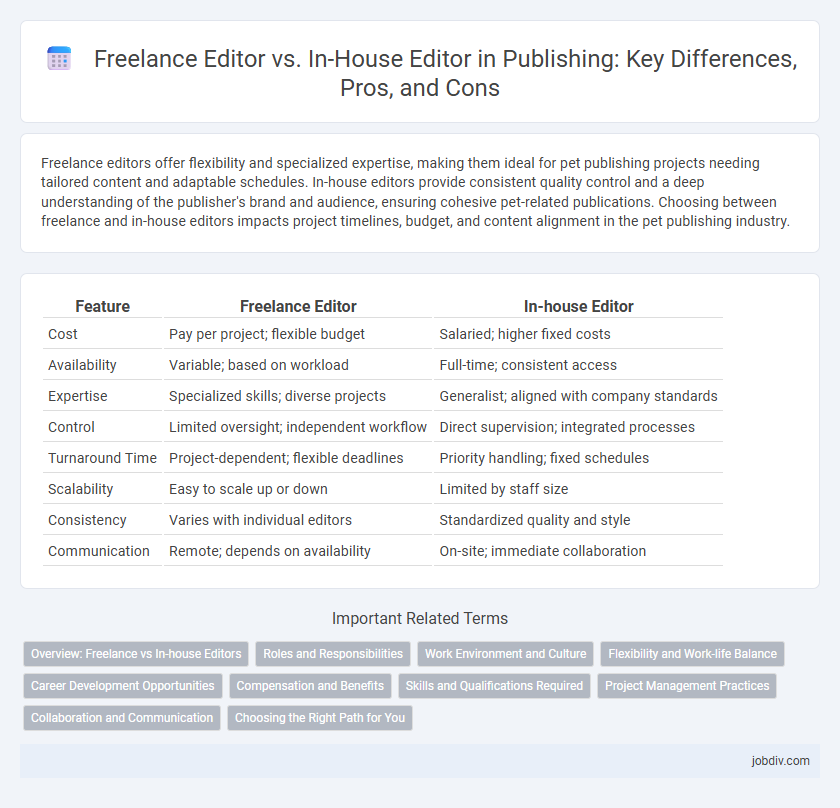Freelance editors offer flexibility and specialized expertise, making them ideal for pet publishing projects needing tailored content and adaptable schedules. In-house editors provide consistent quality control and a deep understanding of the publisher's brand and audience, ensuring cohesive pet-related publications. Choosing between freelance and in-house editors impacts project timelines, budget, and content alignment in the pet publishing industry.
Table of Comparison
| Feature | Freelance Editor | In-house Editor |
|---|---|---|
| Cost | Pay per project; flexible budget | Salaried; higher fixed costs |
| Availability | Variable; based on workload | Full-time; consistent access |
| Expertise | Specialized skills; diverse projects | Generalist; aligned with company standards |
| Control | Limited oversight; independent workflow | Direct supervision; integrated processes |
| Turnaround Time | Project-dependent; flexible deadlines | Priority handling; fixed schedules |
| Scalability | Easy to scale up or down | Limited by staff size |
| Consistency | Varies with individual editors | Standardized quality and style |
| Communication | Remote; depends on availability | On-site; immediate collaboration |
Overview: Freelance vs In-house Editors
Freelance editors offer flexible project-based services, allowing publishers to scale editorial support according to workload and specific expertise needs. In-house editors provide consistent, ongoing oversight with deep integration into a publisher's brand voice and workflow, ensuring uniform quality across all publications. Choosing between freelance and in-house editors depends on factors like budget, project scope, and the need for specialized editorial skills.
Roles and Responsibilities
Freelance editors manage diverse projects, offering specialized services such as developmental editing, copyediting, and proofreading on a contract basis, enabling flexibility and client-specific customization. In-house editors typically oversee a consistent workflow, ensuring adherence to the publisher's style guides, managing timelines, and coordinating with authors and design teams for cohesive publication quality. Both roles demand strong editorial skills, but freelancers excel in adaptability across genres, while in-house editors provide sustained brand voice and process continuity.
Work Environment and Culture
Freelance editors often enjoy a flexible work environment, managing diverse projects across various clients, which fosters adaptability and self-motivation. In-house editors work within a structured setting, collaborating closely with teams and aligning with the company's consistent editorial standards and deadlines. The culture for freelance editors emphasizes independence and entrepreneurial skills, whereas in-house editors experience a more stable, collaborative workplace culture.
Flexibility and Work-life Balance
Freelance editors enjoy greater flexibility in scheduling, allowing for customized work hours that support improved work-life balance compared to in-house editors with fixed office hours. In-house editors often face stricter deadlines and less control over their workload, potentially leading to increased stress and limited personal time. Flexibility in freelance editing promotes autonomy and the ability to balance personal commitments alongside professional responsibilities.
Career Development Opportunities
Freelance editors often experience diverse career development opportunities by working with varied clients and projects, enhancing adaptability and specialized skills across multiple industries. In-house editors benefit from structured growth paths with consistent mentorship, long-term team collaboration, and access to company resources for professional training. Choosing between freelance and in-house editing roles depends on whether one prioritizes flexible skill expansion or stable career progression within a single organization.
Compensation and Benefits
Freelance editors typically earn variable income based on project volume and rates negotiated, lacking consistent benefits like health insurance or retirement plans. In-house editors receive a stable salary with employer-sponsored benefits, including paid leave, healthcare, and career development support, contributing to long-term financial security. Compensation packages for in-house editors often include bonuses and comprehensive perks that freelancers need to secure independently.
Skills and Qualifications Required
Freelance editors must possess versatile skills in copyediting, proofreading, and subject-matter expertise to adapt to diverse projects and clients, often requiring proficiency in multiple style guides and advanced time-management abilities. In-house editors typically need specialized knowledge relevant to the company's niche, strong collaboration skills, and familiarity with internal workflows and publication standards. Both roles demand exceptional attention to detail, excellent communication, and proficiency with editing software, but freelancers must also excel in self-promotion and client management.
Project Management Practices
Freelance editors often leverage flexible project management tools like Trello or Asana to coordinate tasks independently and communicate directly with multiple clients, ensuring adaptability and customized workflows. In-house editors benefit from integrated project management systems embedded within the publishing company's infrastructure, facilitating streamlined collaboration and consistent adherence to internal style guides and deadlines. Effective project management in both roles hinges on clear communication, deadline tracking, and task prioritization to maintain quality and efficiency in the editorial process.
Collaboration and Communication
Freelance editors often leverage digital tools and flexible schedules to facilitate communication across different time zones, enhancing collaboration with authors and publishers in diverse locations. In-house editors benefit from daily face-to-face interactions, fostering immediate feedback and seamless teamwork within the publishing team. Both roles require tailored communication strategies to align editorial goals and maintain consistency throughout the publication process.
Choosing the Right Path for You
Freelance editors offer flexibility and diverse project opportunities, allowing for control over workload and niche specialization, while in-house editors benefit from consistent salaries, structured environments, and collaborative teams. Evaluating personal priorities, such as work-life balance, financial stability, and career growth, is crucial in deciding between freelance and in-house editing roles. Understanding industry demands, contract negotiations, and networking strategies helps tailor the choice to individual professional goals in publishing.
Freelance Editor vs In-house Editor Infographic

 jobdiv.com
jobdiv.com